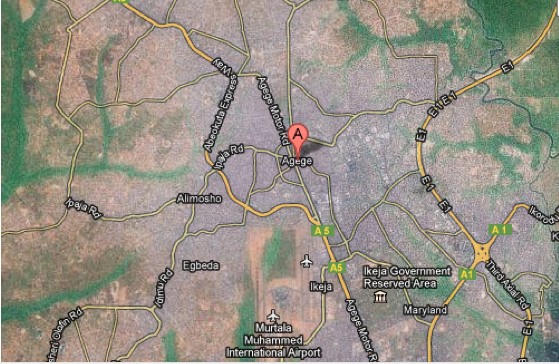
By Pablo Arboleda
Diagnostic
Agege is one of 16 Local Government Areas of Metropolitan Lagos. It is located in 11 square kilometers area in northern Lagos and according with 2006 Population Census has 459,939 inhabitants. Agege has a population density of 41,066 inhabitants per square kilometers; however, its density could be higher. The Metropolitan Lagos Government claims that its real population was underestimated in the census. Agege has been developed around a railway station on the Lagos-Abeokuta line and an international highway, becoming a transit point for goods and people and a settlement for national and international migrants. Its inhabitants come from different ethnicities and nationalities; people from all walks of life, poor and middle class, educated and illiterates, skilled and unskilled workers The majority of the people are self-employed; the main occupation of Hausas, Nigerian and Malians is the foreign exchange business, Yorubas are mainly artisans, Ibos are traders, and only a small percentage of people embrace manual labor at Ogba/Ikeja industrial estates. Additionally, a significant group of persons are civil servants (O. Quadry, personal communication, February 4, 2012).
Coping
The provision of social services and physical infrastructure in Agege was neglected because, until 1967, it was subject to the Government of the Western Region, whose capital Ibadan was over a hundred miles away. In 1967, Agege was added to the Municipality of Lagos bringing closer an accountable government. The population surge makes it difficult a proper planning, and existing infrastructure is over-utilized. Its heavily built up areas, with private and public buildings of around three-story, are populated by 9 to 15 inhabitants per household. Although there is piped water supply, providing about 2.4 million liters of water per day, the majority of the population has to rely on private wells for its daily water provision, or has to buy it from local vendors who sell water in 25-liter jerry cans (O. Quadry, personal communication, February 4, 2012). With the limitations of water supply the majority of households use pit toilets and only a small percentage has access to flush toilets (Simbowale Osinubi, 2003). The streets are narrow and poorly maintained; for transportation, people rely on rickety minivans carrying about 14 passengers, some travel on tricycle ‘ keke marwa ‘ and others use motorcycles called okada. The provision of electricity has improved because of a government financed rehabilitation plan. However, when the federal power company does not generate adequate electricity, causing power outages, people rely on small generating station to power their homes and businesses (O. Quadry, personal communication, February 4, 2012). The main concern of the community has been safety, provided by the Community Development Associations (CDAs) and the Market Associations. These institutions have been created for and are controlled by the communities to foster local solutions. These political actors connect the communities with local, state, and federal governments (Olukoju, 2005).
Response
To fund and implement projects it is necessary to create a mechanism for funding and independent oversight, for instance, to eliminate local corruption and improve project implementation. To improve the sanitary system of Agege, a first step must be the creation of a network of public restrooms with better quality, subsidized by the government but paid for and operated by the communities. Guaranteeing a good health is the basis to improve on other social and economical necessities.
References
Olukoju, A. (2005). Actors and institutions in urban politics in Nigeria: Agege (Lagos) since the 1950s. Working papers Nr. 58 Department of Anthropology and African Studies, Johannes Gutenberg-Universitat.
Simbolawe Osinubi, T. (2003). Urban Poverty in Nigeria: A case study of Agege area of Lagos State, Nigeria. Department of Economics, Faculty of the Social Sciences, University of Ibadan.